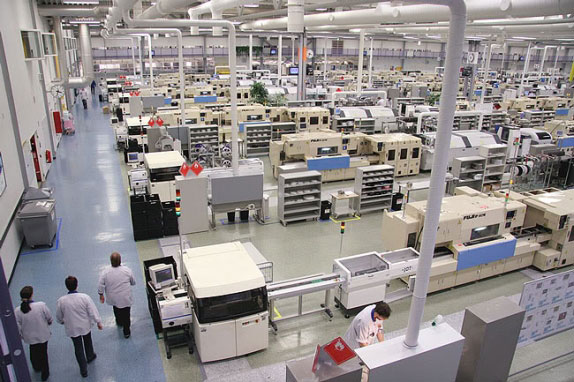Microsoft to pass on old tech ban

Nokia Vietnam factory illustration photo source : quantrimang.com
According to the Government Office, Prime Minister Nguyen Tan Dung ordered the Ministry of Science and Technology (MoST) to delay the implementation of Circular 20/2014//TT-BKHCN that was due to take effect on September 1, 2014.
The order was made after Microsoft complained that its production expansion at the Nokia Vietnam factory based in the northern province of Bac Ninh could be negatively affected by the circular. Microsoft in April announced it intended to close four factories in China, Hungary and Mexico, and shift 39 production lines to Vietnam. This change has actually been implemented since May. Microsoft is afraid that during the relocation, which is expected to be completed in February 2015, it may fall victim to the implementation of Circular 20.
According to the circular, enterprises are allowed to import five year-old used machinery, which is regarded as being 80 per cent of its original quality. In addition, the equipment or machinery must not be included on the banned list issued by the MoST.
Tran Manh Hung, managing lawyer of Baker & McKenzie Vietnam, said that it was very unlikely that the assembly line equipment that Microsoft planned to import from foreign countries would be subject to the importation restrictions of Circular 20.
“If Microsoft is trying to relocate its Nokia manufacturing facilities from foreign countries to Vietnam, it can be inferred that Microsoft is looking to import its most advanced assembly line equipment to Vietnam, in order to maximise its production capacity and efficiency,” he said. Hung assumed that such cutting-edge assembly lines were the product of many years of research and development, and thus were closely-guarded business secrets which directly contribute to the success of Microsoft and Nokia.
“There are other important benefits to importing this equipment to Vietnam that should be considered. For example, if the assembly line is imported to Vietnam, many Vietnamese engineers will have the rare opportunity to work with, and learn about, the state-of-the-art manufacturing technologies. In my view, the assembly line equipment would fall within the exemption from the application of Circular 20,” added Hung.
The lawyer said the Vietnamese government should support hi-tech companies including Microsoft’s efforts to expand its manufacturing activities in Vietnam, because they would contribute significantly to the accomplishment of the objectives outlined in the government’s National High-Technology Development Programme until 2020.
What the stars mean:
★ Poor ★ ★ Promising ★★★ Good ★★★★ Very good ★★★★★ Exceptional
Latest News
More News
- Hermes joins Long Thanh cargo terminal development (February 04, 2026 | 15:59)
- SCG enhances production and distribution in Vietnam (February 04, 2026 | 08:00)
- UNIVACCO strengthens Asia expansion with Vietnam facility (February 03, 2026 | 08:00)
- Cai Mep Ha Port project wins approval with $1.95bn investment (February 02, 2026 | 16:17)
- Repositioning Vietnam in Asia’s manufacturing race (February 02, 2026 | 16:00)
- Manufacturing growth remains solid in early 2026 (February 02, 2026 | 15:28)
- Navigating venture capital trends across the continent (February 02, 2026 | 14:00)
- Motivations to achieve high growth (February 02, 2026 | 11:00)
- Capacity and regulations among British areas of expertise in IFCs (February 02, 2026 | 09:09)
- Transition underway in German investment across Vietnam (February 02, 2026 | 08:00)
















 Mobile Version
Mobile Version